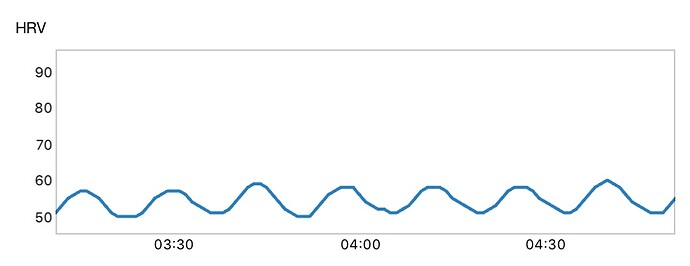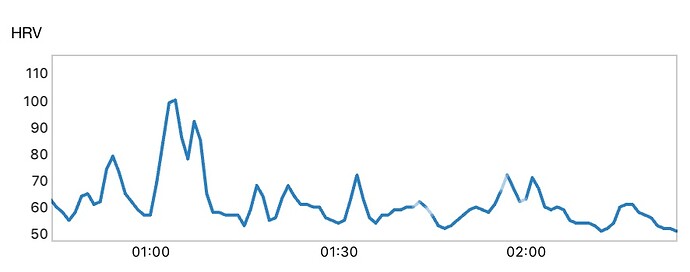To further @Captain_Doughnutman “nerdy” talk on heart rate and breathing., it actually isn’t necessarily the breathing In through the nose that is the initiator of slowing down breathing or heart rate. It’s the exhaling that will have more control on the breathe rate and heart rate.
Heart rate is actually controlled by both the PNS AND the SNS. The SNS releases the hormones (catecholamines - epinephrine and norepinephrine) to accelerate the heart rate, while the PNS releases the hormone acetylcholine to slow the heart rate. This is regardless of breathing through the nose or mouth. What breathing through the nose does however, is slows the heart rate through inhibiting short fast breaths.
Breathing In is thought to control the the SNS side of things and the more deliberate and longer the exhale can initiate the PNS to slow things down when it comes to heart rate. They both also affects Heart Rate Variablility (HRV).
Below I will attach a segment of an hrv reading that I did to illustrate this. The first graph with nice uniform waves is when I am deliberately controlling heart rate and HRV through breathing and what’s called coherence. The second one is not trying to deliberately breathe in any particular way, not in coherence. Typically breathing around six breaths per minute will bring someone into coherence. More to it than that, but that is the largest factor. Again, regardless of through the nose or mouth in either instance. The nose breathing just slows the whole process down because it slows the process down where mouth breathing does not. Think, drinking a glass of water through a straw, as opposed to straight from the glass.
So… while this doesn’t give the answer you may be looking for, it illustrates how breathing and heart rate are interrelated. If you focus on the exhale, the inhale will take care of itself and the lungs will refill automatically. Discarding carbon dioxide is one part of the equation but focussing on the exhale also will help to decrease heart rate if you can get breathing under control, during high intensity OR low intensity. When you become proficient at this you can literally watch it take place if you are monitoring heart rate while working out.
Th same readings above could have been done while I was exercising and the outcomes will be similar to those graphs, albeit harder to control.
Now, as far as breathing, again, it is exhaling that is the biggest determinant of exhaustion of the diaphragm and breathing muscles. This can be strengthened (exhale) and has the greatest impact on performance in endurance events. Focussing on Strengthening the inhale musculature does not have significant changes or impact on performance whereas exhale strength and force does.
I won’t get into all the details but the evidence on all of this breathing information can be found in a good synopsis by Alison McConnell who is considered the leading authority on breathing muscle training. If you want a good read on the topic, see Breathe Strong Perform Better, as its is a good place to start on why all of this “breathing” has an impact and why breathing may matter, other than the obvious, to keep us alive😉

